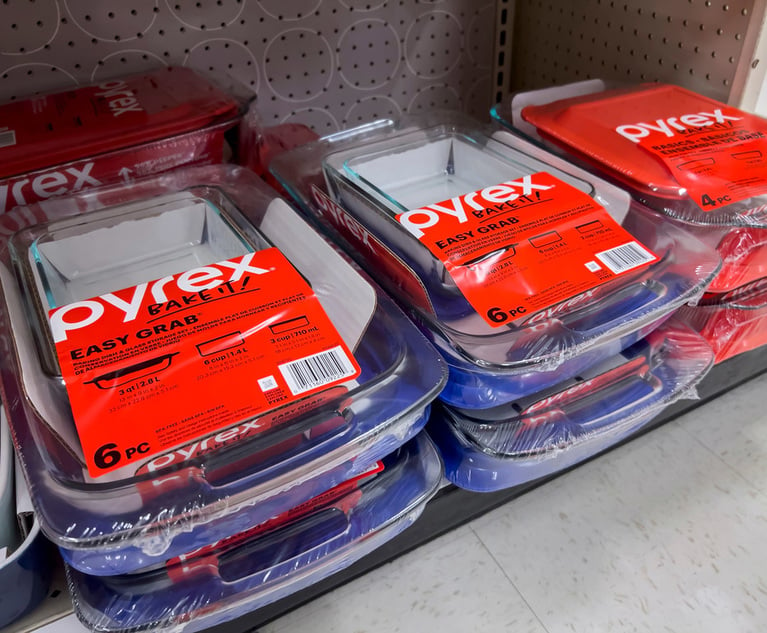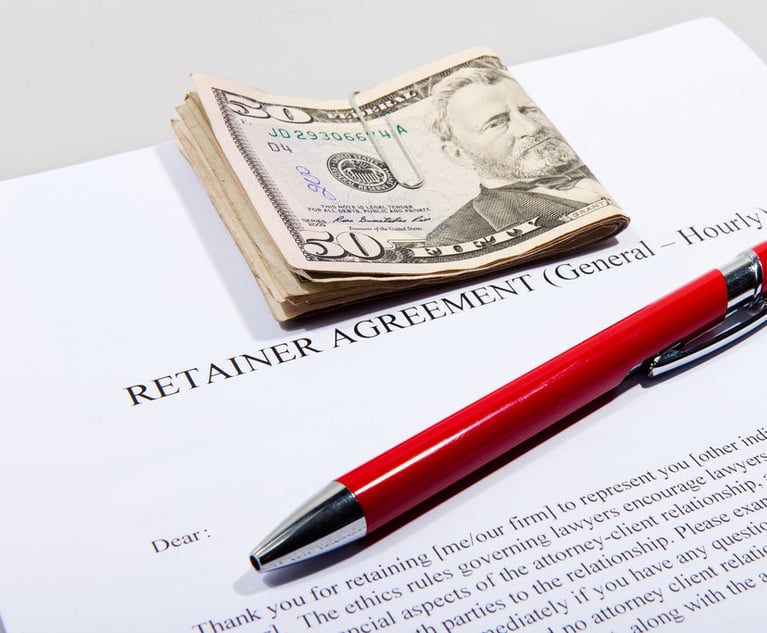Court: Workers' Comp Benefits Shouldn't Be Suspended for Inability to Make Bail
A Coca-Cola employee should not have had his workers' compensation benefits suspended for the period of time he spent in pretrial incarceration, the Commonwealth Court has ruled.
May 23, 2019 at 09:30 AM
5 minute read

A Coca-Cola employee should not have had his workers' compensation benefits suspended for the period of time he spent in pretrial incarceration, the Commonwealth Court has ruled.
In a precedential May 22 opinion in Sadler v. Workers' Compensation Appeal Board (Philadelphia Coca-Cola), a three-judge appellate panel voted 2-1 to reverse an order of the Workers' Compensation Appeal Board. The board had upheld a workers' compensation judge's decision that granted Philadelphia Coca-Cola's petition to suspend claimant Carl Sadler's workers' compensation benefits for 525 days and denied Sadler's petition to review Coca-Cola's calculation of his average weekly wage.
According to the Commonwealth Court's opinion, Sadler was charged with an unspecified crime and incarcerated for 525 days pretrial because he was unable to post bail. He ultimately pleaded guilty and was sentenced to 525 days time served.
Under Section 306(a.1) of the Workers' Compensation Act, an employer is not required to pay benefits “for any period during which the employee is incarcerated after a conviction.”
Coca-Cola argued that because Sadler was sentenced to time served after he pleaded guilty, the period he spent in jail before trial counts as incarceration after a conviction.
But the Commonwealth Court panel, led by Judge Renee Cohn Jubelirer, rejected that argument.
“Here, claimant was not incarcerated, or removed from the workforce, after his conviction,” Jubelirer said. “There is no argument that claimant at all times has a work-related injury that prevents him from earning wages. Prior to his conviction, claimant was incarcerated because of his inability to make bail, not because of a conviction for criminal conduct. To suspend claimant's benefits during a period that he is not incarcerated after a conviction, and during which his loss of earning power is caused by his work injury, essentially punishes him because he was unable to meet bail. This is not consistent with the humanitarian purpose of the act and is not consistent with the plain language of Section 306(a.1).”
Judge Christine Fizzano Cannon joined Jubelirer's opinion.
Judge Anne Covey penned a dissenting opinion, arguing that all claimants who are sentenced to incarceration following a conviction should be treated the same, regardless of when they actually served their time.
“The undisputed record evidence reveals that claimant was sentenced to 525 days for his conviction, that is approximately one year, five months and 10 days,” Covey said. ”It is 'absurd or unreasonable' and clearly contrary to the legislative intent, for a claimant who can afford bail to have his WC benefits suspended upon conviction, while a claimant who cannot, keeps his WC benefits. Further, such an interpretation creates an unequal application of the law for similarly-situated claimants, i.e., claimants who violate the Pennsylvania Crimes Code and have their WC benefits suspended and those who violate the Pennsylvania Crimes Code yet continue to receive WC benefits. Similarly, such an interpretation also treats similarly-situated employers disparately.”
The majority and dissenting opinions also tackled the issue of Coca-Cola's calculation of Sadler's average weekly wage (AWW).
Sadler had taken issue with the calculated AWW of 40.51 hours per week, arguing that he regularly worked overtime and that the AWW was “artificially deflated” because it included the week he was injured, during which he only worked 10 hours, according to the majority opinion. He also disputed the testimony of his plant manager, Dennis Veneri, that Sadler was expected to work 40 hours per week.
Coca-Cola argued that the WCJ credited Veneri's testimony and discredited Sadler's testimony when making the AWW determination.
But while the majority noted that the question of how many hours Sadler was expected to work was a question of fact for the WCJ, the judge's factual findings were not supported by substantial evidence, including credited testimony by Veneri that Sadler was told he would work more than 60 hours per week during the 100 days of summer when the company is busiest.
“In summary, to determine the hours claimant 'actually worked on average,' requires the calculation to 'reflect the economic reality of … [c]laimant's recent pre-injury earning experience,'” Jubelirer said. “The WCJ's calculation here did not do so, as it counted as a full work week the pay he received when he was injured on Monday and could not work the rest of the week, and further did not include any overtime hours contrary to the credited testimony and evidence.”
But Covey took issue with that determination as well.
“In the instant case, had claimant not been injured, his expected work hours would be 40 hours per week with probable overtime during the 100-day busy season,” she said. ”Thus, 60 hours per week would not be an 'accurate and realistic measure of what [claimant] could have expected to earn had he not been injured.'”
The majority, however, responded in a footnote that its holding should not be read as deeming 60 hours the appropriate measure for calculating Sadler's AWW.
“Rather, the court is remanding the matter for the WCJ to properly recalculate claimant's AWW, including considering claimant's 'probable overtime' the WCJ found based upon employer's credited testimony,” Jubelirer said.
Counsel for Sadler, Richard Jaffe of Law Offices of Richard A. Jaffe in Philadelphia, did not return a call seeking comment. Counsel for Coca-Cola, Andrea Weaver of Anthony J. Bilotti & Associates in Media, also did not return a call for comment.
(Copies of the 38-page opinion in Sadler v. Workers' Compensation Appeal Board, PICS No. 19-0638, are available at http://at.law.com/PICS.)
This content has been archived. It is available through our partners, LexisNexis® and Bloomberg Law.
To view this content, please continue to their sites.
Not a Lexis Subscriber?
Subscribe Now
Not a Bloomberg Law Subscriber?
Subscribe Now
NOT FOR REPRINT
© 2024 ALM Global, LLC, All Rights Reserved. Request academic re-use from www.copyright.com. All other uses, submit a request to [email protected]. For more information visit Asset & Logo Licensing.
You Might Like
View All
Immunity for Mental Health Care and Coverage for CBD: What's on the Pa. High Court's November Calendar
5 minute read

Trending Stories
- 1Amazon, SpaceX Press Constitutional Challenges to NLRB at 5th Circuit
- 2Schools Win Again: Social Media Fails to Strike Public Nuisance Claims
- 3Spencer Lawton, Savannah Prosecutor Who Tried ‘Midnight in the Garden’ Case, Dies at 81
- 4Uber Not Responsible for Turning Over Information on 'Dangerous Riders' to Competitor, Judge Finds
- 5Steve Bannon 'We Build The Wall' Fraud Trial Pushed to February 2025
Who Got The Work
Michael G. Bongiorno, Andrew Scott Dulberg and Elizabeth E. Driscoll from Wilmer Cutler Pickering Hale and Dorr have stepped in to represent Symbotic Inc., an A.I.-enabled technology platform that focuses on increasing supply chain efficiency, and other defendants in a pending shareholder derivative lawsuit. The case, filed Oct. 2 in Massachusetts District Court by the Brown Law Firm on behalf of Stephen Austen, accuses certain officers and directors of misleading investors in regard to Symbotic's potential for margin growth by failing to disclose that the company was not equipped to timely deploy its systems or manage expenses through project delays. The case, assigned to U.S. District Judge Nathaniel M. Gorton, is 1:24-cv-12522, Austen v. Cohen et al.
Who Got The Work
Edmund Polubinski and Marie Killmond of Davis Polk & Wardwell have entered appearances for data platform software development company MongoDB and other defendants in a pending shareholder derivative lawsuit. The action, filed Oct. 7 in New York Southern District Court by the Brown Law Firm, accuses the company's directors and/or officers of falsely expressing confidence in the company’s restructuring of its sales incentive plan and downplaying the severity of decreases in its upfront commitments. The case is 1:24-cv-07594, Roy v. Ittycheria et al.
Who Got The Work
Amy O. Bruchs and Kurt F. Ellison of Michael Best & Friedrich have entered appearances for Epic Systems Corp. in a pending employment discrimination lawsuit. The suit was filed Sept. 7 in Wisconsin Western District Court by Levine Eisberner LLC and Siri & Glimstad on behalf of a project manager who claims that he was wrongfully terminated after applying for a religious exemption to the defendant's COVID-19 vaccine mandate. The case, assigned to U.S. Magistrate Judge Anita Marie Boor, is 3:24-cv-00630, Secker, Nathan v. Epic Systems Corporation.
Who Got The Work
David X. Sullivan, Thomas J. Finn and Gregory A. Hall from McCarter & English have entered appearances for Sunrun Installation Services in a pending civil rights lawsuit. The complaint was filed Sept. 4 in Connecticut District Court by attorney Robert M. Berke on behalf of former employee George Edward Steins, who was arrested and charged with employing an unregistered home improvement salesperson. The complaint alleges that had Sunrun informed the Connecticut Department of Consumer Protection that the plaintiff's employment had ended in 2017 and that he no longer held Sunrun's home improvement contractor license, he would not have been hit with charges, which were dismissed in May 2024. The case, assigned to U.S. District Judge Jeffrey A. Meyer, is 3:24-cv-01423, Steins v. Sunrun, Inc. et al.
Who Got The Work
Greenberg Traurig shareholder Joshua L. Raskin has entered an appearance for boohoo.com UK Ltd. in a pending patent infringement lawsuit. The suit, filed Sept. 3 in Texas Eastern District Court by Rozier Hardt McDonough on behalf of Alto Dynamics, asserts five patents related to an online shopping platform. The case, assigned to U.S. District Judge Rodney Gilstrap, is 2:24-cv-00719, Alto Dynamics, LLC v. boohoo.com UK Limited.
Featured Firms
Law Offices of Gary Martin Hays & Associates, P.C.
(470) 294-1674
Law Offices of Mark E. Salomone
(857) 444-6468
Smith & Hassler
(713) 739-1250






